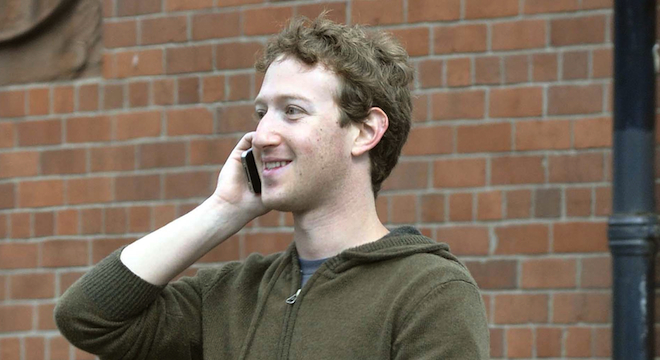Updated 6:02 p.m. EDT, Thursday, October 25
For over two years, rumors have swirled that Facebook was secretly making efforts to build a smartphone of its own.
And the rumors, or the hopes for a Facebook phone, persist despite Facebook founder and CEO Mark Zuckerberg’s own statements to the contrary, namely when he said in an interview at TechCrunch Disrupt in September: “That’s always been the wrong strategy for us.”
But on Tuesday, during Facebook’s better-than-expected third quarter earnings call, Zuckerberg revealed a bit more about Facebook’s mobile device strategy, including just why building a new Facebook smartphone or tablet wouldn’t make much sense at this time.
“We’re really an information sharing platform. We never were an environment for running apps,” Zuckerberg said during the question-and-answer period of the call (at minute 51). “Even on desktop, when you have these games that are very deeply connected to Facebook, they’re not building in some kind of Facebook environment. They’re basically building websites that connect with Facebook and make it so that you can pull your friends in and then use Facebook for distribution and sharing.”
The admission was a surprising one given Facebook’s launch of its own “App Center” in June, a dedicated section on Facebook’s website and mobile site where users can go to download apps that integrate with Facebook and allow users to sign-in with their Facebook accounts or post game updates to Facebook, such as Zynga’s popular “Words With Friends.”
Zuckerberg’s comment on Facebook’s own mobile app ecosystem was doubly intriguing given just how many people play popular social games on Facebook, up to 235 million as of August 2012*, Facebook said.
Still, Zuckberg’s declaration that Facebook wasn’t designed to be an apps ecosystem in the same sort as those offered by Apple (through the App Store and Mac App Store) and Google (through Google Play and the Chrome App Store) was timely given struggling social gaming company and Facebook revenue-driver Zynga’s move just hours before on Tuesday to lay off five percent of its staff.
Put another way: It wouldn’t have sounded reassuring to investors had Zuckerberg said Facebook’s futures were on becoming the next great gaming apps platform when the leading social gaming company is tanking.
That said, Zuckerberg was clear in stating that Facebook believes mobile opportunities are central to its future: Facebook reported 600 million monthly active users on its mobile website and apps for Android and Apple’s iOS, over half of the total 1.01 billion users on the world’s biggest social network globally.
“I mention these stats where eight of the top ten iOS apps are connected to Facebook and forty percent of the top four hundred iOS apps have the Facebook SDK and are using that in some capacity,” said Zuckerberg. “So to me that’s a good sign.”
The equation seems to be this: As more apps integrate with Facebook in any capacity, Facebook would then be able to get more data on its users with which to better target its mobile ads. But Zuckerberg was clear in stating that his vision for the Facebook app ecosystem is quite distinct from that of Apple and Google’s mobile operating systems.
“So what I see on mobile is, I don’t think that developers are going to be building apps that are literally inside the Facebook app, but what we do so is a lot of success in getting developers to connect their apps to Facebook,” Zuckerberg said.
As Zuckerberg sees it, Facebook will be the ultimate-platform agnostic software for putting social functions in apps, across competing mobile devices.
“We don’t directly compete with iOS or Android to be a platform for developers as an environment for building apps,” Zuckerberg explained. “We think that we can basically build an environment, or build this information platform, that goes across iOS and Android and mobile web and every other mobile platform that’s out there, where every developer who’s building anything on anything can use Facebook and we think that puts us in a really strong position.”
The approach seems to be a wise one as the mobile space continues to splinter heading into 2013, dividing further from Google’s Android and Apple’s iOS operating systems into the Barnes & Nobile Nook App Store and Amazon Appstore for Android (Amazon is reportedly working on its own phone), as well as a new Mozilla Firefox mobile operating system and of course, the Windows Store and Windows Phone Store, the latter two of which Microsoft is about to open concurrent with the launch of its Windows 8 and Windows Phone 8 operating systems (October 26 and October 29, respectively).
If Facebook can be on all of those platforms at the same time — as well as offer developers on all of those competing platforms the opportunity to tap into the same pool of Facebook users and allow those users to share their app activity with their Facebook Friends, Facebook itself could end up being the most recognizable and widely-used of any mobile brand.
*Late update: Facebook gamers now number 251 million as of October 2012, TechCrunch reported, a gain of six percent in the past two months alone.






